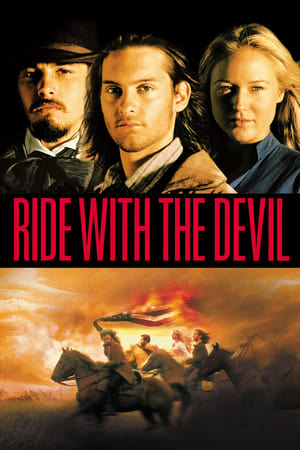
Ride with the Devil
I'd be bad meat – pretty well rotted to a glob. Ride with the Devil is directed by Ang Lee and adapted to screenplay by James Schamus (also producer) from the novel "Woe to Live On" written by Daniel Woodrell. It stars Tobey Maguire, Skeet Ulrich, Jeffrey Wright, Jonathan Rhys-Meyers, Simon Baker, James Caviezel and Jewel. Music is by Mychael Danna and cinematography by Frederick Elmes. "On the Western Frontier of Missouri, the American Civil War was fought not by armies, but by neighbours. Informal gangs of local Southern Bushwhackers fought a bloody and desperate Guerrilla war against the occupying Union Army and pro-Union Jayhawkers. Allegiance to either side was dangerous. But it was more dangerous still to find oneself caught in the middle" Made for $38 million and intended to be a sweeping epic for the summer blockbuster crowd, Ride with the Devil was a considerable financial flop. With a limited release both in America and abroad, the financial figures are hardly surprising. More so considering it was given next to no promotion by the distributors. Factor in a little controversy about the events featured in the story, some cuts made by the studio (Lee didn't have final cut) and a delay in home release formats because the distributor incredibly wanted Jeffrey Wright's presence removed from the cover art! Well you would be forgiven for thinking that the film has to be something of a stinker. Not so say I. Part rites of passage drama, part reflective war movie, Ang Lee's film is a grand film viewing experience. Dealing as it does with the often forgotten part of the war down on the Missouri/Kansas border, where Lee also shoots on location, film manages to be both savage and lyrical in equal measure. The savagery comes with the fights, bloody, frenetic and high on potency, while the lyricism comes with the human relationships, internal conflicts and the political awareness of the men (boys) fighting for their cause. All given deft treatment by Schamus, whose screenplay contains crisp period dialogue and a narrative correctly showing that this part of the war was not just driven by racist Dixie's hell bent on revenge, violent lust and political allegiance, but often for family, land and rights. Picture is at pains to let us know the youth of the main characters, ramming home the point of boys forced to become men, killing machines, very quickly. Case in point, the culmination of the violence in the film that comes by way of the Lawrence Massacre, a tragic and upsetting slaughter that saw 180 people murdered under the leadership of a vengeful William Quantrill (John Ales). Lee and Schamus aren't interested in showing heroism in this particular war, they show it as futile, nasty and it leaves the taste of bile in the throat. From here the film slows considerably, as the lead characters withdraw from the action of war, to awakenings and friendships forming. It's here where Lee is at his best. No great director of action, as evidenced by the previously mentioned Lawrence Massacre; which lacks the cutting edge to really grab us by the throat and never let go, but for human interest aspects and bucolic scenes with characters framed within, Lee owes film fans absolutely nothing. The latter of which he is aided considerably by Elmes' widescreen photography. Ulrich and pop star Jewel nicely handle their parts, he puts a confident swagger into Jack Bull Chiles, she is tender and unassuming in the pivotal female role of Sue Lee Shelley. Caviezel gives Black John Ambrose a brooding menace, while Jonathan Rhys-Meyers is on overdrive as sadistic loony Pitt Mackeson. But it's with Maguire and Wright that the acting plaudits go. Maguire has arguably never been better, he gives Jake Roedel an effective sensitivity as a virginal boy receives a violent initiation into manhood. Wright is sublime, said to be one of his favourite performances, Wright as freed slave Daniel Holt is the heart beat of the film. Conveying most of the good traits available to man, Holt fights not just out of loyalty to his friend George Clyde (Baker), but to gain ultimate catharsis in is life. It's a beautiful measured turn from Wright, and it deserves more appreciative attention. The last third of it may be too talky for some, and a couple of dangling narrative threads left unanswered stop it from being a masterpiece. But it's close to being just that, a savage, beautiful and lyrical movie. The stupid studio execs had no idea: Putz's. 9/10
